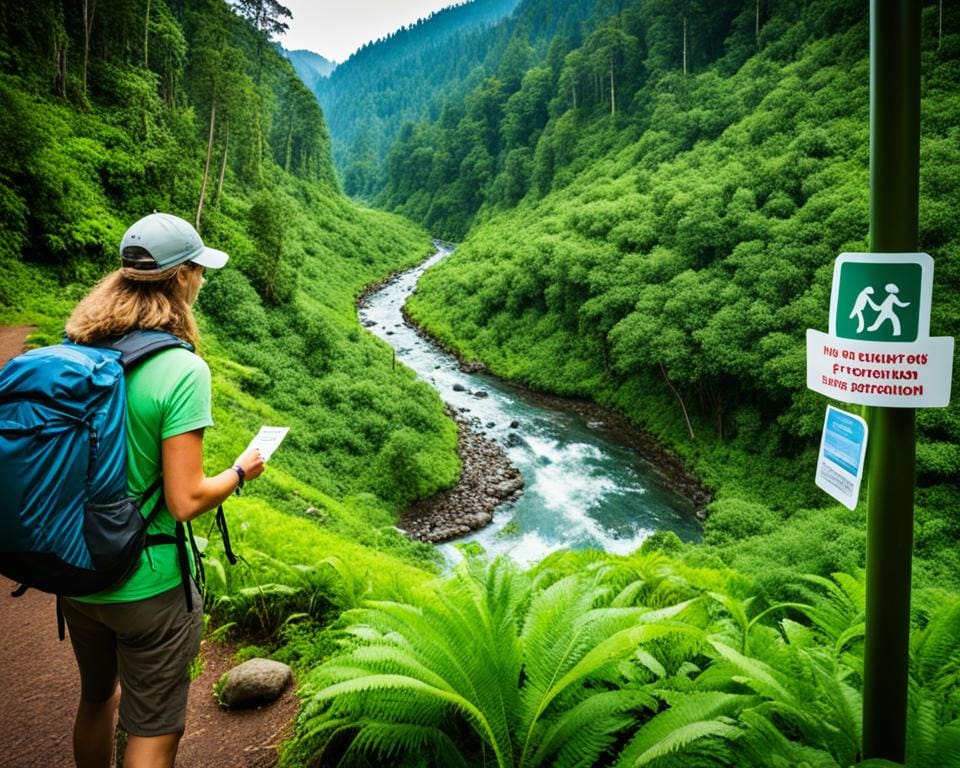In 2019, over 1.4 billion people traveled internationally, highlighting the need for sustainable tourism. This approach is crucial for protecting our planet and its cultures. A study by Booking.com found that 76% of travelers want to travel more sustainably. Yet, many don’t know how to start.
Tourism helps economies grow but also adds 8% to global carbon emissions. We need tips for responsible travel to lessen our impact on nature. Sustainable tourism tries to balance economic, human, and environmental health. This helps communities and our planet.
Hawaii and Palau show us how to reduce tourism’s negative effects. By connecting with local cultures and supporting local businesses, travelers can have a positive impact. We’ll look at ways to adopt eco-friendly travel habits that matter to thoughtful travelers in the next sections.
Understanding Sustainable Tourism
Sustainable tourism is a key movement in the travel world. It aims to reduce bad effects and benefit local places and the environment. This approach combines growing economically with being good to the earth and people. More and more people want to travel this way. They choose to honor nature and different cultures.
Definition and Importance
Travel has changed a lot because people want to take trips that do good. The UN Environment Program says sustainable tourism looks at its effects now and in the future. It’s about balancing economic, social, and environmental impacts. This balance helps create a travel culture that is good for the planet and the people living in travel spots.
The Rise of Sustainable Travel
More people are seeing the bad sides of too much tourism, like being too crowded and dirty. Surveys show about 69% of people want the travel world to offer green options. Ecotourism is becoming a big deal. It could be worth $299 billion by 2026. Choosing places that care about ecotourism helps save nature and helps local areas make money.

How to Travel Sustainably and Responsibly
Setting off on a trip lets us see new places and cultures. Traveling sustainably makes the journey better and helps our planet. When we travel, making green choices is key. We impact the environment with our destination and transport choices.
Implementing Eco-friendly Travel Practices
Picking less crowded routes is a good start to green travel. This fights overtourism and gives us richer cultural experiences. Staying longer in one place helps us connect more and harms the environment less.
It’s vital to choose where we stay carefully. Staying at eco-lodges or eco-resorts that are certified helps the planet. These places work on using less energy and reducing waste.
Choosing Transportation Wisely
How we get around makes a big difference in our travel’s carbon footprint. It’s behind most of a holiday’s emissions. Flying has a big impact, so it’s important to think about other ways to travel.
Taking the train can cut down emissions a lot compared to flying. Trains can be six times less polluting. Buses or sharing rides also help reduce our carbon marks. Choosing to bike or use electric vehicles are other green options.
Choosing green travel habits and transportation helps the earth. Every choice, big or small, can help local places and the planet.
Supporting Local Communities Through Travel
Traveling sustainably means more than just caring for the environment. It’s about helping local communities through our journeys. By engaging with local cultures and spending responsibly, we make a positive impact. This makes our travels more meaningful and helps the places we visit.
Engagement with Local Cultures
Experiencing true travel involves immersing ourselves in local cultures. This engagement offers us unique and enriching experiences. By taking part in activities like cooking classes or guided tours, we understand the community better.
These experiences help us connect and support local businesses. They provide economic help to local artisans and those in hospitality.
Responsible Spending Practices
How we spend money during travel can greatly help local communities. Staying in locally owned places and eating at local restaurants keeps the money within the community. Buying local items supports artisans and conserves traditional crafts.
Programs like Pack for a Purpose allow us to contribute even more. By packing supplies for community projects, we make an extra difference. Focusing on local economies makes our travel beneficial for everyone involved.
Reducing Your Carbon Footprint While Traveling
Traveling sustainably is necessary in today’s climate change battle. Your actions matter because tourism adds up to 8% of global carbon emissions. By choosing mindful travel, you help cut down on your carbon footprint. For example, packing 15 pounds less can save about 80 pounds of emissions on a long flight. Also, flying economy instead of business can make a big difference in your carbon impact.
Think ethical when you plan your trips. Eating local, seasonal foods not only tastes great but also supports the area’s economy and reduces your environmental impact. Food production creates a lot of greenhouse gases, so each meal choice is important. Also, consider where you stay; accommodations represent 21% of tourism’s CO2 emissions. Eco-certified hotels are a way to ensure your visit is sustainable.
Be smart about how you get around. Choosing a hybrid or electric car over an SUV cuts carbon emissions. Small actions, like turning off lights or using a ‘Do Not Disturb’ sign, save energy. By making these choices, we all contribute to a healthier planet. This way, your travel not only becomes more meaningful but also benefits the places you visit.









